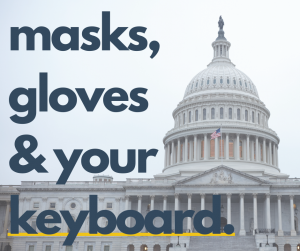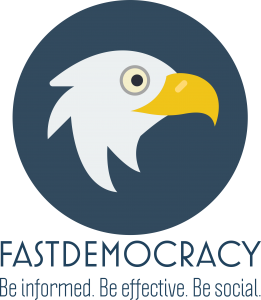Masks, gloves, and your keyboard: Tips for shaping your government in the time of COVID-19
 We get it. These are strange and uncertain times, especially in terms of how you can engage with the government and keep safe. You need a product built on the founding mission that government should be transparent and that technology should put government at your fingertips. With FastDemocracy as your digital partner, you can still be a successful advocate, even from home. Here’s how:
We get it. These are strange and uncertain times, especially in terms of how you can engage with the government and keep safe. You need a product built on the founding mission that government should be transparent and that technology should put government at your fingertips. With FastDemocracy as your digital partner, you can still be a successful advocate, even from home. Here’s how:
1. Stay in touch.
Even when your state government isn’t meeting publicly, the work continues. Use the “contact your legislator” feature on the FastDemocracy platform to remind legislators about what’s important to you and share updates on how changing concerns directly impact your family. Use our news feature to look up your legislator and see them “in the news.” This will let you know if they are working hard or hardly working.
2. Compare responses.
Responses to COVID-19 vary significantly state to state. While approaches range from tepid to robust, knowing how your state compares can help pressure your state government effectively.
Knowing how your state stacks up, also allows you to be innovative. See a good idea in Michigan? Why not try that in Wisconsin? Imitation is the highest form of flattery. If it works elsewhere it might, with a few tweaks, work for your state too and you have the added benefit of learning from what worked (and didn’t) for other states to perfect your advocacy. Use our “compare bill” feature to see commonalities across the country.
3. Hold them accountable.
Your legislators are working in extreme circumstances, in masks, in small numbers on the floor of their chambers, and, problematically, often without public access. However, you can still hold them accountable. Use the voting records feature on FastDemocracy to follow along with what your elected is doing. Let them know that you are watching them (even while socially distant!) and that you plan to inform your community about their voting record during the primaries and general election. With FastDemocracy, you can search for voting records by topic, by bill, and both. FastDemocracy combs through thousands of pages of voting records, so you don’t have to but you can be the check on power your government needs.
When the Government Goes Dark
 The actions of governments at a local, state, and federal level are meant to be public. Their votes and voices as they debate issues of vital interest to their constituents are meant to be heard, meant to prompt accountability from voters come the next election. But what happens when the government goes dark?
The actions of governments at a local, state, and federal level are meant to be public. Their votes and voices as they debate issues of vital interest to their constituents are meant to be heard, meant to prompt accountability from voters come the next election. But what happens when the government goes dark?
Right now, we are witnessing government action without public input. In the rush to address urgent needs presented by COVID-19, the core values of open and transparent government are stymied.
Government has not innovated enough to be digitally democratic.
At a local level, it’s through yard signs, facebook events, and flyers left rubber banded to doors where residents learn of new open forums. At the state level, most live debate is not recorded on video, often it is even a struggle to find a room that is video equipped (provided the lawmakers themselves do not wish to avoid the inconvenience of being watched). At the federal level, we have better resourced watchers, with CSPAN and the national press corps hard at work, yet when the lawmakers themselves can’t enter into chambers without masks, gloves, and social distancing- what are we missing behind the scenes?
If we want government by the people and for the people, we must allow people access to government, even, and perhaps most urgently, in times of crisis. 
When this pandemic ends and we find our new “normal,” will that normalcy include a technological revolution? A prioritization of government transparency so that no official remains inscrutable? That’s unlikely. Doing so would shift power away from elected officials who, through limiting information, shape the narratives we consume.
We have to fuel the technological revolution through industry innovation. Force government transparency by making votes accessible by topic, force accountability by informing the people when their input can be most effective, take the vast resource of machine learning and become predictive about the behaviors of elected officials so we can stay in front of the curve. In this time of darkness, where governments approve budgets in the shadows, hold elections in chaos, and sacrifice open government for expedient government, legislative analytics platforms are key players. They must pioneer solutions to allow us, the people, to remain as watch guards of liberty.
State governments advance legislation to address COVID-19 crisis
 As the COVID-19 crisis continues to play out across the world and people everywhere are looking to make sense of this unique, chaotic situation, many Americans are keeping their eyes glued to the news to stay updated on what the president and Congress are doing to keep us safe. The federal government has recently passed three bills in an effort to keep the Americans safe and blunt economic damage caused by the global pandemic. Most recently, President Trump signed the CARES Act, a bill worth $2 trillion to prevent a large-scale economic fallout.
As the COVID-19 crisis continues to play out across the world and people everywhere are looking to make sense of this unique, chaotic situation, many Americans are keeping their eyes glued to the news to stay updated on what the president and Congress are doing to keep us safe. The federal government has recently passed three bills in an effort to keep the Americans safe and blunt economic damage caused by the global pandemic. Most recently, President Trump signed the CARES Act, a bill worth $2 trillion to prevent a large-scale economic fallout.
While action on a national level is undoubtedly necessary if the government is to provide safety for Americans and their savings, states are also working to make an impact through not only their gubernatorial actions but also the movement of bills through their legislatures. Here are some of the actions being taken across the United States to combat coronavirus. You can learn more about what your state legislature is doing to address the COVID-19 crisis by signing up for free email updates at FastDemocracy.com.
1. Waive K-12 requirements due to COVID-19 closures
Because of the need to avoid large gatherings in the coming months, a number of states have been working to pass bills that will allow schools to conduct classes online, while other states have put a pause on instruction altogether until the coronavirus situation has slowed. In order to take pressure off both instructors and families, some states have brought up legislation that will reduce the mandatory number of hours of instruction that students must receive each week.
2. Mandating insurance companies provide testing without co-pays
Given that the coronavirus has been deemed a national emergency, many states are taking action to make sure health insurance companies cover the cost of coronavirus testing. The driving idea behind this is twofold – first, to ensure that dealing with coronavirus is not cost-prohibitive, and second to stop the virus from spreading further across the larger population.
3. Temporarily change unemployment eligibility requirements
As a result of mandatory quarantines and the inability of many businesses to continue turning a profit when customers are remaining at home, state legislatures across the nation are making it easier for workers who have been laid off to access unemployment benefits. Early access to unemployment benefits would assist impacted workers maintain financial stability.
4. Preventing eviction and foreclosure during COVID-19
Because many Americans are currently finding themselves unable to go to work, concern regarding the payment of rent and utilities is growing. As such, some state legislatures are ensuring that those affected by the economic implications of the virus do not end up without a home. This legislation does not necessarily waive rent, mortgage, or utility payments; it just prevents eviction and foreclosure or the threat of eviction or foreclosure while the COVID-19 crisis is ongoing.
5. Halt debt collection
With unemployment claims rapidly increasing,
so are workers’ concerns about their ability to meet financial obligations. To
further assist workers impacted by the economic slow-down due to coronavirus, some
state legislatures are considering legislation that would pause debt repayments
in order to help Americans avoid bankruptcy.
Throughout the COVID-19 crisis, state and local governments have been on the forefront of proposing policy solutions to help prevent the spread of the virus and assist affected workers and families. Because of the large impact that state legislatures can have in the fight against COVID-19 by passing bills like those listed above, it is now more important than ever that American citizens stay current on what is happening in government at all levels. You can learn more about what the state and federal governments are doing to address the COVID-19 crisis by signing up for free email updates at FastDemocracy.com.
FastDemocracy top prize winner at the Pure Pitch Rally

| FOR IMMEDIATE RELEASE:
October 10, 2018 |
FastDemocracy top prize winner at Pure Pitch Rally startup competition
KANSAS CITY, Mo. — FastDemocracy today won prizes worth $110,000 and the People’s Choice Award at the Pure Pitch Rally, earning the company a spot as a top prize winner at the local startup competition. FastDemocracy’s earned cash awards as well as tech services from Amazon Web Service and an office space at WeWork Kansas City.
“We were thrilled to compete among such an impressive slate of entrepreneurs and honored to have earned such support,” said Sara Baker, chief innovation officer at FastDemocracy. “This recognition by venture capitalists and business leaders further validates the effectiveness of FastDemocracy’s platform and the need for innovation in the legislative advocacy industry.”
FastDemocracy competed against seven other area technology startups at the third annual Pure Pitch Rally. Each entrepreneur received three minutes to pitch their business to a panel of judges and investors.
FastDemocracy, founded in 2018 and headquartered in Kansas City, is a state and national legislative analytics platform that uses data-driven analytics and collaborative communications tools to empower professionals and consumers alike to be more informed and effective while advocating for policy change. For more information on FastDemocracy, visit fastdemocracy.com.
###
